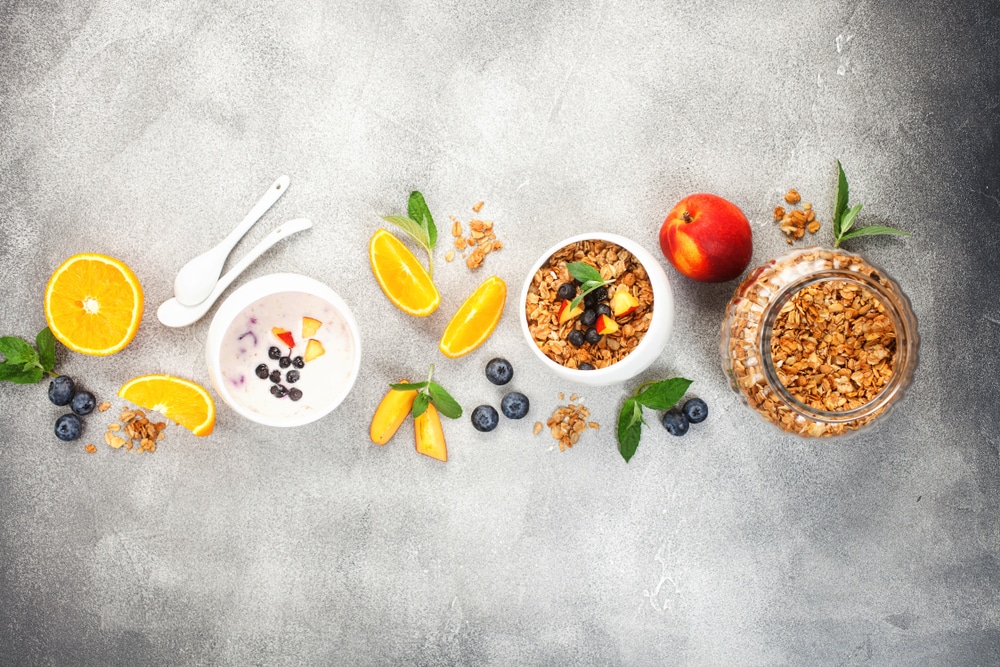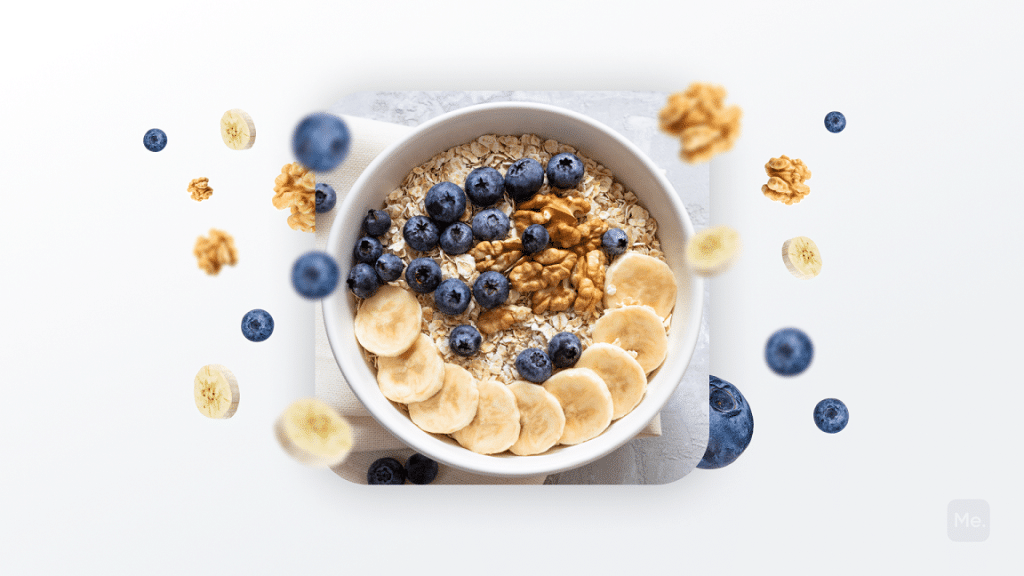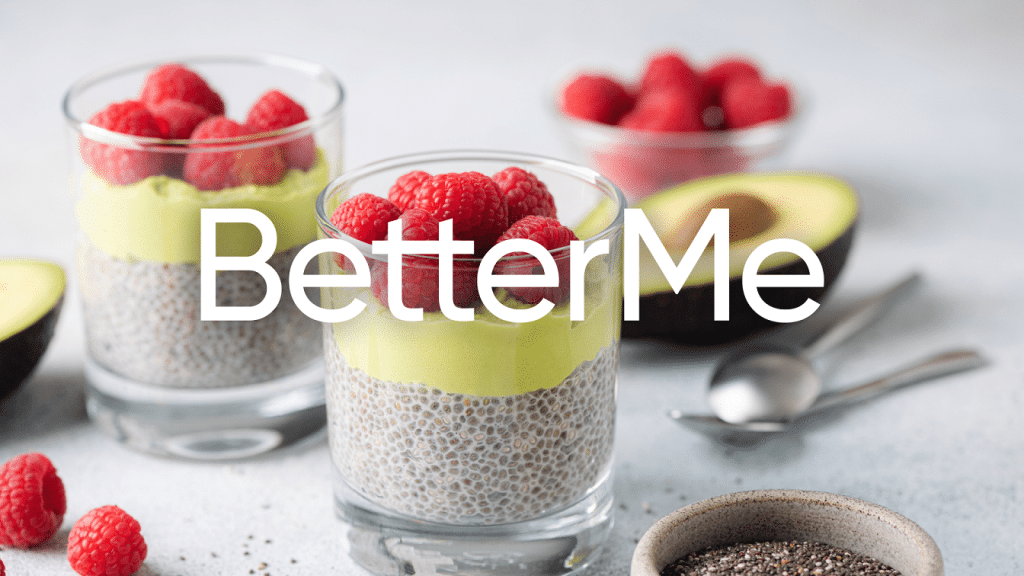A healthy breakfast is one of the most important meals of the day. After a night’s rest, our bodies need nutrients to provide energy for a new day.
Get your personalized
meal plan!

A well-balanced diet will help prevent you from eating too much during the rest of the day and give you long-lasting energy that will make you more productive. Here are ten healthy and delicious foods that can be eaten for breakfast.
Top 10 Breakfast Foods
Here are 10 healthy breakfast foods that should make it to your table:
Eggs
Eggs are a great source of protein for people who need to watch their weight. The protein in eggs helps to keep people full for a long period of time and pounds off the waistline.
An average-sized, hard boiled, whole egg contains about 6 grams of high-quality protein (5).
Eggs also contain other nutrients that make them a tasty choice including choline, selenium, vitamin A (in yolks) and DHA omega-3 fatty acids (in whites) (5).
Choline helps regulate hormone levels which support healthy pregnancy. The choline in eggs can help with fat metabolism and brain function (5).
Selenium supports our immune system while vitamin A plays a role in eye health as well as skin maintenance, and DHA omega-3 fatty acids are the most important fat for the human brain and eye development (5).
Eggs also contain carotenoids, lutein and zeaxanthin which help keep eyes healthy while they play a role in preventing macular degeneration, cataracts, night blindness, and dry AMD (Age Related Macular Degeneration) (5).
In addition to these benefits of eggs as part of a breakfast diet plan, there is another factor that makes them an excellent choice – affordability.
A dozen large eggs cost about $0.99-$0.50 per egg depending on where you live, so it makes it easy to include this protein-rich food into your budget!
Read More: Craving Eggs: Laying Out All The Whys
Oatmeal
Oatmeal is loaded with fiber and has a low glycemic index (GI). One cup has over 11 grams of whole grains that provide complex carbs and B vitamins to give you energy for your day’s activities. A bowl also provides 150% daily value of manganese, 105% DV vitamin E, 60% DV magnesium and 35% DV zinc. It contains beta-glucan, which helps lower cholesterol levels and reduces the risk of heart disease.
The fiber in oats helps the digestive system work better and improves bowel movements. It is a good choice for people with Irritable Bowel Syndrome (IBS) because it can help regulate symptoms of constipation, diarrhea or IBS-related bloating.
It’s also an excellent source of protein. A bowl contains five grams – which is 18% DV in one serving! Protein helps you feel fuller longer so it will keep hunger away until your next mealtime. Plus, oatmeal reduces cravings by stabilizing blood sugar levels giving you long-lasting energy without jitters that come from sugary breakfast options like donuts and muffins!
Oats are easy to make quickly, and sometimes without cooking. Overnight oats are made by simply mixing oats with milk and letting the mixture sit in the fridge for a while.
Finally, you can control the amount of sugar you put in, which avoids unknown amounts of sugar. Instead of adding table sugar, top your oatmeal off with some fresh berries (or any fruit or nuts) for flavor and as an extra boost of nutrition. They’re also among the top 10 breakfast foods that go with honey as a sweetener. Try to avoid pre-packaged flavored oatmeal as it tends to contain a lot of added sugar.
Greek Yogurt
Greek yogurt is an excellent choice for breakfast. It’s high in protein, has a low carbohydrate content (usually less than 15 grams per serving), and moderate fat content. It’s also high in vitamin B12, riboflavin, calcium, and phosphorus.
Studies have shown that the protein in Greek yogurt can help people feel more satisfied while eating and lead to lower levels of ghrelin (the hormone that stimulates hunger) throughout the day (8).
Regular consumption may also promote weight management by helping prevent overeating later on.
Additionally, it has a low-calorie count. One cup of plain nonfat Greek yogurt contains about 100 calories. It’s a great option if you’re trying to limit your caloric intake or lose weight because its high protein content prevents excessive calorie absorption from other foods eaten during the same meal.
Greek Yogurt helps with digestion too: The probiotics stimulate healthy gut bacteria growth, which can reduce the risk of stomach ulcers (2).
Finally, it’s also a good source of bone-building calcium (9).
Greek yogurt is a versatile breakfast option as it can be eaten with fruit or blended into a smoothie.
Want to build an attention-grabbing bubble butt, blast away fat that’s stored in all the wrong places, spring-clean your diet, turn back the clock on your skin, skyrocket your self-confidence and shatter your insecurities? Check out the BetterMe app and set this plan in motion!
Green Tea
Green tea is a healthy beverage to have for breakfast because it contains many nutrients and antioxidants. It’s high in vitamin C which can potentially help fight illness. It boosts the immune system with its rich antioxidant content that includes flavonoids such as catechins.
This beverage could assist weight loss by boosting thermogenesis or heat production in brown adipose tissue while decreasing lipolysis or fat breakdown in white adipocytes. The process increases energy expenditure during periods when resting metabolically like morning hours where we don’t need much energy.
It also helps lower cholesterol levels and reduces the risk of heart disease.
Protein Shake
Protein shakes can be a great breakfast choice for those who don’t have time to make their own high-protein breakfast. The protein in the shake helps you build muscle when used frequently alongside exercise (3). It also provides sustained energy which will keep hunger away until your next mealtime.
They’re also easy to pack when on the go, so they work well if you go out of town or are traveling with children. Protein shakes allow people that tend towards dieting by substituting one meal per day with another high-calorie food item like this one.
Protein powder can be made of whey, soy, pea or vegan protein. The shakes are most often made of whey and water but can also be made with cow’s or soy milk for an added boost to your calcium intake.
Be thoughtful that they have the potential to add hundreds of calories per day because they contain upwards of 200-300 grams per shake (3). They should never replace two full meals in one day; rather it’s best if you restrict them to just breakfast or as a meal replacement when on the go.
Berries
Berries can help give you more fiber than other fruits as well as fight inflammation caused by sugar levels going too high or low through their antioxidants. They also contain many different types of phytonutrients which may reduce risk factors associated with obesity, heart disease, and cancer like a flavonoid called anthocyanidin (found in blueberries) which has been found to help with gut bacteria (1).
Besides being good for your health, berries taste great too! They are available in a variety of different flavors and colors which can make any morning more interesting. You can eat them as is or put them on top of yogurt, cereal, cobbler, or pancakes.
Read More: 10 Tips For A Healthy Lifestyle, According To Science
Soy Milk
If you suffer from lactose intolerance or dairy-related allergies, know that your symptoms will be lessened by this milk alternative. It contains no traces of this allergen as it is a plant-based product and has been proven to have many benefits for those with food sensitivities. One study even states that not only does soy positively affect digestion but also provides relief for sufferers of Irritable Bowel Syndrome (IBS) (7).
In addition to being high in vitamins and minerals, drinking soy also helps lower cholesterol levels because it contains plant sterols known as phytosterols that inhibit LDL (bad) cholesterol absorption by blocking its entry into cells. The increased presence of good cholesterol HDL then causes more bad fat deposits in arteries to dissolve away naturally.
Not only this but there’s been research that suggests that soy may help regulate blood sugar levels and in turn reduce the risk of type-II diabetes (4).
You can have soy milk with cereal, in coffee or, for a change of pace, in smoothies and protein shakes.
Chia Seeds
Chia seeds are an excellent source of omega-3 fatty acids, fiber, and protein. A serving of two tablespoons provides 12 grams of fat, 18 grams of carbohydrates, 11 grams of dietary fiber, and six times as much calcium as milk.
The seeds provide a lot more than just nutrition: they have been linked to many health benefits including weight loss, reduced risk for diabetes and heart disease, boosting energy levels and promoting healthy skin.
Chia has long been hailed for its ability to hold moisture in the body which can help people stay fuller longer while it also helps maintain regular bowel movements. This is due to their high water content; one ounce contains 11 grams of this nutrient!
You can have these in smoothies, pastries, as a yogurt topping or in flavored water.
Fruit Smoothie
Fruit smoothies are easy enough that they don’t require any cooking skills and making one at home costs less than buying something premade or even ordering an expensive iced coffee each time we want some cold refreshment! Smoothies pack lots of vitamins into every sip as well, which means more energy without having to eat anything heavy first thing in the morning. All these qualities make them perfect for busy people looking for healthy foods to eat for breakfast.
When it comes to weight loss, progress is made by inches, not miles, so it’s much harder to track and a lot easier to give up. BetterMe app is your personal trainer, nutritionist and support system all in one. Start using our app to stay on track and hold yourself accountable!
Nuts
Peanuts, almonds, cashews, and other nuts have many nutrients including healthy fats which are important for a healthy lifestyle. They can also help lower cholesterol levels, prevent diabetes and even regulate blood sugar levels in people who don’t suffer from diabetes (6).
This food helps increase the intake of protein and the high fiber content in these also make them great at keeping you full for long. Nuts in the form of spreads are a versatile breakfast option that can be added to smoothies or spread on whole-wheat bread. Remember that even if nuts are a good source of fat, eating excessive amounts can still lead to weight gain.
The Bottom Line
Many people skip breakfast because they don’t have enough time in the morning or it is inconvenient to prepare food in a rush. However, it is one of the most important meals of the day. It provides the body with much-needed fuel to start the day. You should consider having the ten healthy and delicious foods in this article as part of a balanced diet.
DISCLAIMER:
This article is intended for general informational purposes only and does not address individual circumstances. It is not a substitute for professional advice or help and should not be relied on to make decisions of any kind. Any action you take upon the information presented in this article is strictly at your own risk and responsibility!
SOURCES:
- Berries: emerging impact on cardiovascular health (2011, nih.gov)
- Effects of probiotics on gut microbiota: mechanisms of intestinal immunomodulation and neuromodulation (2013, nih.gov)
- Effects of Protein Supplementation on Performance and Recovery in Resistance and Endurance Training (2018, nih.gov)
- EFFECTS OF SOY PROTEIN AND ISOFLAVONES ON INSULIN RESISTANCE AND ADIPONECTIN IN MALE MONKEYS (2009, nih.gov)
- Eggs (n.d., harvard.edu)
- Health Benefits of Nut Consumption (2010, nih.gov)
- Soy Isoflavones Supplementation for Patients with Irritable Bowel Syndrome: A Randomized Double Blind Clinical Trial (2015, nih.gov)
- The effects of high protein diets on thermogenesis, satiety and weight loss: a critical review (2004, nih.gov)
- The use of calcium and vitamin D in the management of osteoporosis (2008, nih.gov)











